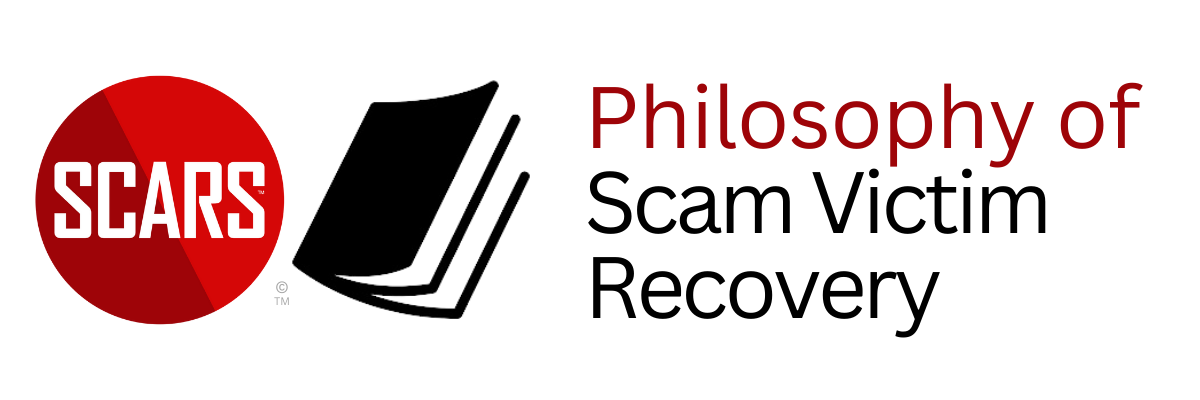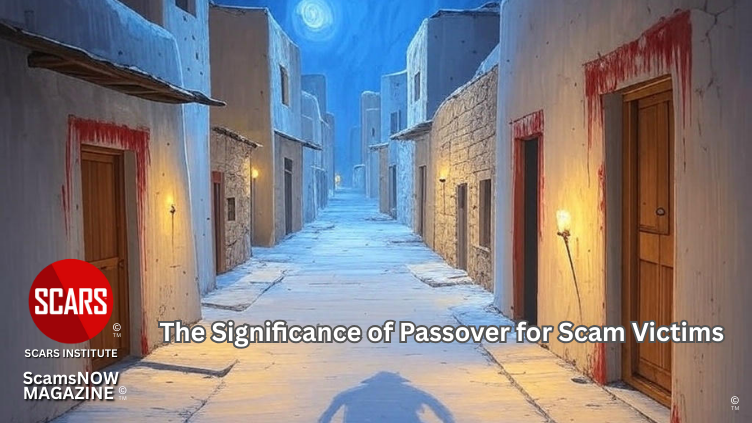The Significance of Passover for Scam Victims
From Bondage to Liberation: How the Themes of Passover Illuminate the Path to Scam Victim Recovery
Primary Category: Scam Victim Recovery Philosophy
Intended Audience: Scam Victims-Survivors / Family & Friends
Author:
• Tim McGuinness, Ph.D., DFin, MCPO, MAnth – Anthropologist, Scientist, Polymath, Director of the Society of Citizens Against Relationship Scams Inc.
About This Article
The journey of scam victim recovery mirrors the ancient Passover story of liberation from bondage, carrying universal themes of suffering, endurance, and transformation. Just as the Israelites escaped Egyptian slavery and wandered through uncertainty toward freedom, you too can move from emotional captivity and betrayal toward healing and personal renewal. This path includes reclaiming trust, confronting systemic injustice, reshaping identity through shared memory, and ultimately finding strength through community and advocacy.
Recovery doesn’t erase the pain, but it offers a framework to make meaning from it—reminding you that survival is possible, that shame can be replaced by self-compassion, and that your experience, once integrated, can become a source of strength for others. The story of Passover affirms that healing is not a return to the past but a movement into a new self—one grounded in dignity, resilience, and the ability to walk forward with purpose. You are not defined by what was done to you; you are shaped by how you choose to rise from it.

From Bondage to Liberation: How the Themes of Passover Illuminate the Path to Scam Victims’ Recovery
A Journey from Oppression to Renewal
Passover is a story of bondage, defiance, and eventual deliverance. For thousands of years, Jewish communities have commemorated the Exodus from Egypt—a powerful narrative of people enslaved, struggling against injustice, and ultimately reclaiming their freedom. But beyond its historical and religious significance, Passover reveals deeper truths about the nature of trauma, survival, and transformation. It offers universal lessons about what it means to endure harm, reclaim identity, and walk forward with purpose.
If you’ve been the victim of a scam, your journey may feel very different, but at its core, it carries the same rhythm. You were trapped in a deception. You were used and discarded. You may have felt powerless. You may still feel lost. But just like the Israelites who walked out of Egypt, you can take steps toward liberation and healing—not in a single act, but in a process marked by self-reflection, reconnection, and radical honesty.
The Exodus narrative does not promise an easy path. In fact, the Israelites wandered for forty years before entering the Promised Land. Likewise, scam recovery does not offer quick fixes. It requires patience, courage, and a willingness to face hard truths. But within that journey lies something sacred: the ability to rebuild your sense of self, your place in the world, and your capacity to care again—even after betrayal.
The Bondage of Deception: Recognizing the Trap
The Israelites did not start out free. For generations, they were held under the oppressive rule of Pharaoh, subjected to forced labor and cruelty. There was no dignity in their servitude—only survival.
In many ways, being caught in a scam resembles this condition of bondage. When you are deceived—whether through romance, investment, impersonation, or business fraud—you become bound to a false promise. You may invest your money, your time, your hopes, or your love into something that turns out to be a lie. And often, that lie becomes so consuming that you stop seeing clearly.
Many scam victims report a period of mental captivity—where even after suspicions arise, they still feel compelled to trust. You might know something is wrong, but you’re afraid to walk away. The emotional manipulation is strong. It mirrors the paralysis the Israelites faced, even after Moses began his call for liberation. Leaving bondage requires more than recognizing oppression—it requires believing you’re allowed to want more.
Liberation from Psychological Captivity
Liberation in the Passover story was not just physical—it was also psychological. The Israelites had to unlearn the mindset of slavery. They had to remember who they were as a people. They had to move from fear to faith, from survival to identity.
For you, as a scam victim, the first step is acknowledging what happened. This can be the hardest part. You may want to minimize it or blame yourself. But like the Israelites stepping out of Egypt with nothing but their courage and what they could carry, you don’t need to have all the answers. You just need to be willing to begin.
Freedom starts with truth. And truth is not shameful. You were deceived, yes. But that doesn’t mean you were weak. It means you were targeted by someone who understood how to manipulate. Walking away from that experience is not just about ending contact with the scammer—it’s about beginning a new relationship with yourself. One that is built on honesty, safety, and compassion.
Faith and Redemption in the Wilderness
The journey through the desert was long and filled with doubt. At times, the Israelites wanted to go back to Egypt—because slavery, though cruel, was familiar. Freedom was terrifying. They questioned Moses. They questioned God. They questioned themselves.
You might feel this too. After a scam, your trust is fractured—not just in others, but in yourself. You might doubt your judgment. You might feel foolish or permanently damaged. You might wish you could go back in time to undo the whole thing. These feelings are real, and they deserve space.
But redemption is not a return to what was. It is a movement forward into what can be. You don’t have to restore the life you had before. You can build something stronger and more grounded. The Israelites didn’t go back to Egypt. They didn’t become who they were before slavery. They became something entirely new.
For you, redemption means giving yourself permission to heal—even when you don’t feel like you deserve it. It means reaching out for help. It means allowing others to witness your pain without judgment. It means choosing growth over shame. And it begins when you start believing that recovery is possible, even if you don’t yet see the way.
The Plague of Injustice and the Need for Change
In the Passover story, Pharaoh’s refusal to release the Israelites brings devastating plagues. These were not random punishments. They were consequences of systemic cruelty and unchecked power.
Scams are not just personal misfortunes. They reflect a larger crisis. Criminals exploit gaps in technology, regulation, public awareness, and human vulnerability. And far too often, victims are left without meaningful recourse. You may have found that the police didn’t help. That your bank denied responsibility. That friends or family didn’t understand.
This is injustice. And like the plagues, it creates widespread suffering—not only for you but for countless others. The fight against scams cannot rest solely on your shoulders. It requires collective response: better education, stronger laws, more ethical platforms, and well-funded recovery services. But while those changes are underway, your task is to honor your own experience.
Your pain is real. It matters. And it’s not your fault. In speaking up, sharing your story, or simply acknowledging the systemic nature of what happened to you, you begin to reclaim power—not only for yourself but for others who may follow.
Memory, Identity, and the Ritual of Recovery
Passover is a festival built on memory. During the Seder, participants retell the Exodus story as if they themselves were there. This is not just tradition—it’s transformation. The act of remembering reinforces identity. It says: We were enslaved, but now we are free. We were oppressed, but now we speak.
As a scam victim, you may struggle with identity. The experience of being manipulated can make you feel unrecognizable—to yourself and others. You may question who you are, or whether you are still capable of trusting, loving, or believing.
But memory can be your ally. When you remember what you’ve survived—and when you share that truth—you begin to rebuild who you are. Support groups offer space for this ritual. Therapy helps you name what happened. Journaling allows you to trace your recovery. Each time you tell your story with clarity, without shame, you reconnect to yourself.
This is not about living in the past. It’s about integrating it. The Israelites didn’t forget Egypt. They remembered it so they would never be enslaved again. You don’t have to forget the scam. But you can remember it as part of a larger story—a story in which you endure, grow, and emerge whole.
Social Justice, Advocacy, and Empathy
One of the most powerful messages of Passover is the obligation to care for others. “You shall not oppress a stranger,” the Torah says, “for you were strangers in the land of Egypt.” This is not just empathy. It is solidarity.
As you heal, you may find yourself drawn to help others. You may speak to new victims. You may write or educate or advocate. This is not required. But it is a gift. Because in helping others, you affirm your own recovery. You say: I survived. And now I will help someone else find the way.
Many survivors discover that advocacy becomes part of their identity—not as a burden, but as a purpose. Whether you attend a support group, volunteer, or simply offer a kind word to someone who has just discovered they were scammed, your experience becomes a light. It guides others through the darkness you once knew too well.
This is the fulfillment of Passover’s highest calling: not just to escape bondage, but to build a just world where others are protected and uplifted.
Scarcity and Sustenance—The Role of Matzah
During Passover, unleavened bread—matzah—is eaten as a reminder of haste. The Israelites fled Egypt so quickly, they could not wait for their bread to rise.
This small detail carries immense symbolism. In times of trauma, you often act without clarity. You do what you must to survive. There may not be time for a full plan. After the scam, you may have made choices quickly—some good, some less so. You might have withdrawn, lashed out, or tried to pretend everything was fine. That’s okay. Matzah reminds you: survival is messy, not elegant. But it counts.
Later, you can make sense of what happened. You can choose what to carry forward. But in the moment of crisis, give yourself grace. You did what you could with what you had. That’s not failure. That’s strength.
Rebuilding and Long-Term Recovery
The Israelites didn’t go directly from Egypt to paradise. They wandered in the wilderness. They faced doubt, hunger, fear. But in that wandering, they built a new way of life. They learned to trust again—slowly, painfully, but truly.
Your recovery may feel like wandering. Some days you’ll feel strong. Other days, fragile. You may relapse into old thoughts, or question your progress. But this doesn’t mean you’re lost. It means you’re human. The process of rebuilding is not linear. It is cyclical. You return to the same wounds with new tools, new insight.
And in time, you will find your footing. Not because everything is perfect—but because you have chosen to walk forward. Again and again. That is healing.
Walking Into the Future with Dignity
Passover teaches us that recovery is not a straight line. It is a journey—a crossing from bondage to freedom, from silence to voice, from despair to purpose.
As a scam victim, you’ve been hurt in ways few understand. But you are not alone. You are not broken. You are in transition. And with support, honesty, and time, you can move through this—not just as a survivor, but as someone who rises, who grows, who gives.
You have a story. It matters. And it can become a source of light—not just for you, but for others walking their own path through the wilderness.
You are not what was done to you. You are what you choose next.
Let that be your exodus. And let today be the day you begin.
-/ 30 /-
What do you think about this?
Please share your thoughts in a comment below!
Statement About Victim Blaming
SCARS Institute articles examine different aspects of the scam victim experience, as well as those who may have been secondary victims. This work focuses on understanding victimization through the science of victimology, including common psychological and behavioral responses. The purpose is to help victims and survivors understand why these crimes occurred, reduce shame and self-blame, strengthen recovery programs and victim opportunities, and lower the risk of future victimization.
At times, these discussions may sound uncomfortable, overwhelming, or may be mistaken for blame. They are not. Scam victims are never blamed. Our goal is to explain the mechanisms of deception and the human responses that scammers exploit, and the processes that occur after the scam ends, so victims can better understand what happened to them and why it felt convincing at the time, and what the path looks like going forward.
Articles that address the psychology, neurology, physiology, and other characteristics of scams and the victim experience recognize that all people share cognitive and emotional traits that can be manipulated under the right conditions. These characteristics are not flaws. They are normal human functions that criminals deliberately exploit. Victims typically have little awareness of these mechanisms while a scam is unfolding and a very limited ability to control them. Awareness often comes only after the harm has occurred.
By explaining these processes, these articles help victims make sense of their experiences, understand common post-scam reactions, and identify ways to protect themselves moving forward. This knowledge supports recovery by replacing confusion and self-blame with clarity, context, and self-compassion.
Additional educational material on these topics is available at ScamPsychology.org – ScamsNOW.com and other SCARS Institute websites.
-/ 30 /-
What do you think about this?
Please share your thoughts in a comment below!
Important Information for New Scam Victims
- Please visit www.ScamVictimsSupport.org – a SCARS Website for New Scam Victims & Sextortion Victims.
- SCARS Institute now offers its free, safe, and private Scam Survivor’s Support Community at www.SCARScommunity.org – this is not on a social media platform, it is our own safe & secure platform created by the SCARS Institute especially for scam victims & survivors.
- SCARS Institute now offers a free recovery learning program at www.SCARSeducation.org.
- Please visit www.ScamPsychology.org – to more fully understand the psychological concepts involved in scams and scam victim recovery.
If you are looking for local trauma counselors, please visit counseling.AgainstScams.org
If you need to speak with someone now, you can dial 988 or find phone numbers for crisis hotlines all around the world here: www.opencounseling.com/suicide-hotlines
Statement About Victim Blaming
Some of our articles discuss various aspects of victims. This is both about better understanding victims (the science of victimology) and their behaviors and psychology. This helps us to educate victims/survivors about why these crimes happened and not to blame themselves, better develop recovery programs, and help victims avoid scams in the future. At times, this may sound like blaming the victim, but it does not blame scam victims; we are simply explaining the hows and whys of the experience victims have.
These articles, about the Psychology of Scams or Victim Psychology – meaning that all humans have psychological or cognitive characteristics in common that can either be exploited or work against us – help us all to understand the unique challenges victims face before, during, and after scams, fraud, or cybercrimes. These sometimes talk about some of the vulnerabilities the scammers exploit. Victims rarely have control of them or are even aware of them, until something like a scam happens, and then they can learn how their mind works and how to overcome these mechanisms.
Articles like these help victims and others understand these processes and how to help prevent them from being exploited again or to help them recover more easily by understanding their post-scam behaviors. Learn more about the Psychology of Scams at www.ScamPsychology.org
SCARS INSTITUTE RESOURCES:
If You Have Been Victimized By A Scam Or Cybercrime
♦ If you are a victim of scams, go to www.ScamVictimsSupport.org for real knowledge and help
♦ SCARS Institute now offers its free, safe, and private Scam Survivor’s Support Community at www.SCARScommunity.org/register – this is not on a social media platform, it is our own safe & secure platform created by the SCARS Institute especially for scam victims & survivors.
♦ Enroll in SCARS Scam Survivor’s School now at www.SCARSeducation.org
♦ To report criminals, visit https://reporting.AgainstScams.org – we will NEVER give your data to money recovery companies like some do!
♦ Follow us and find our podcasts, webinars, and helpful videos on YouTube: https://www.youtube.com/@RomancescamsNowcom
♦ Learn about the Psychology of Scams at www.ScamPsychology.org
♦ Dig deeper into the reality of scams, fraud, and cybercrime at www.ScamsNOW.com and www.RomanceScamsNOW.com
♦ Scam Survivor’s Stories: www.ScamSurvivorStories.org
♦ For Scam Victim Advocates visit www.ScamVictimsAdvocates.org
♦ See more scammer photos on www.ScammerPhotos.com
You can also find the SCARS Institute’s knowledge and information on Facebook, Instagram, X, LinkedIn, and TruthSocial
Psychology Disclaimer:
All articles about psychology and the human brain on this website are for information & education only
The information provided in this and other SCARS articles are intended for educational and self-help purposes only and should not be construed as a substitute for professional therapy or counseling.
Note about Mindfulness: Mindfulness practices have the potential to create psychological distress for some individuals. Please consult a mental health professional or experienced meditation instructor for guidance should you encounter difficulties.
While any self-help techniques outlined herein may be beneficial for scam victims seeking to recover from their experience and move towards recovery, it is important to consult with a qualified mental health professional before initiating any course of action. Each individual’s experience and needs are unique, and what works for one person may not be suitable for another.
Additionally, any approach may not be appropriate for individuals with certain pre-existing mental health conditions or trauma histories. It is advisable to seek guidance from a licensed therapist or counselor who can provide personalized support, guidance, and treatment tailored to your specific needs.
If you are experiencing significant distress or emotional difficulties related to a scam or other traumatic event, please consult your doctor or mental health provider for appropriate care and support.
Also read our SCARS Institute Statement about Professional Care for Scam Victims – click here
If you are in crisis, feeling desperate, or in despair, please call 988 or your local crisis hotline – international numbers here.
More ScamsNOW.com Articles
A Question of Trust
At the SCARS Institute, we invite you to do your own research on the topics we speak about and publish. Our team investigates the subject being discussed, especially when it comes to understanding the scam victims-survivors’ experience. You can do Google searches, but in many cases, you will have to wade through scientific papers and studies. However, remember that biases and perspectives matter and influence the outcome. Regardless, we encourage you to explore these topics as thoroughly as you can for your own awareness.















![NavyLogo@4x-81[1] The Significance of Passover for Scam Victims - 2025](https://scamsnow.com/wp-content/uploads/2025/04/NavyLogo@4x-811.png)










![scars-institute[1] The Significance of Passover for Scam Victims - 2025](https://scamsnow.com/wp-content/uploads/2025/04/scars-institute1.png)

![niprc1.png1_-150×1501-1[1] The Significance of Passover for Scam Victims - 2025](https://scamsnow.com/wp-content/uploads/2025/04/niprc1.png1_-150x1501-11.webp)